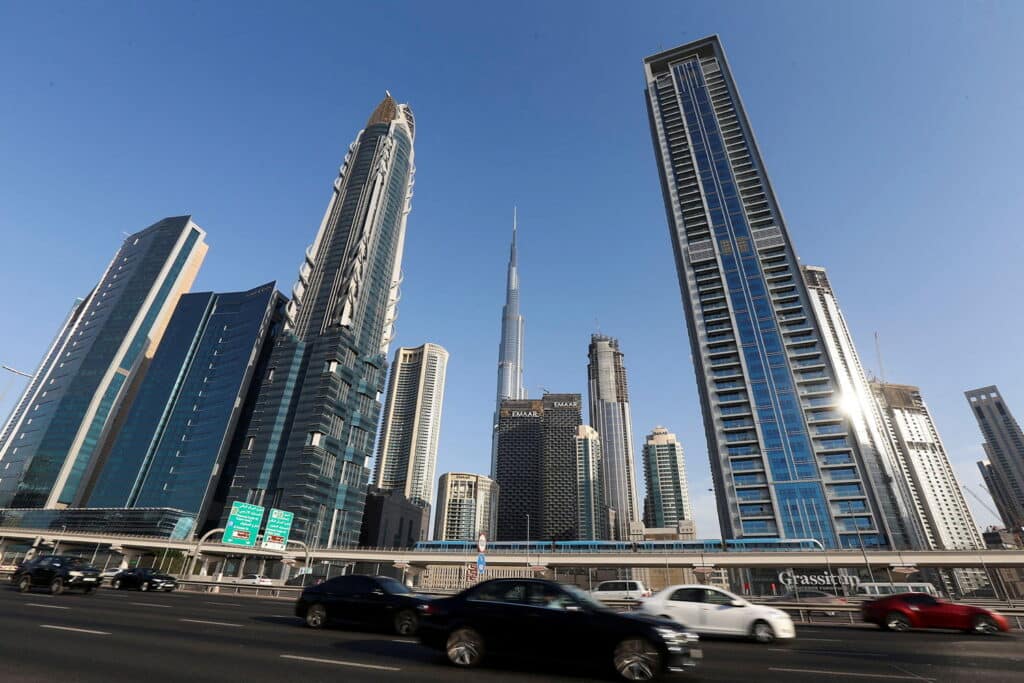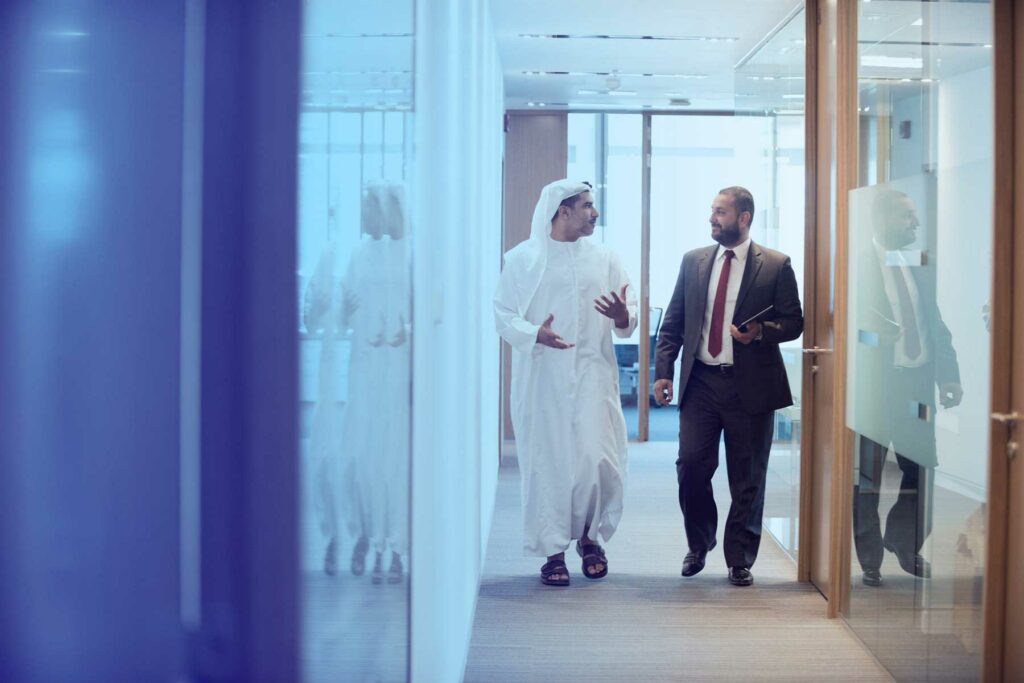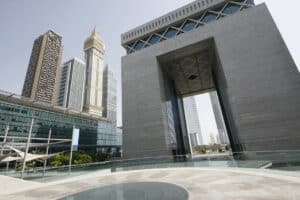The Arab Emirates began its ascent to the economically developed countries after oil production began on their territory in the 20th century. The rulers of the UAE began to invest in the income generated by the sale of black gold in the development of various sectors that could increase budget revenue: tourism, construction, free economic zones, industry, etc.
Naturally, all this contributed to the rapid development of the banking sector. Today, the financial industry in the UAE is an example for many countries due to its reliability, excellent service, minimal account maintenance fees, and much more. However, it is the successful development of the banking industry that has led to the fact that customers, especially foreigners, cannot choose one of the numerous financial institutions.
What is the banking system of the UAE?

In 1980, the UAE government passed the Federal Law, which outlined the functions of the Central Bank and the activities of financial institutions subordinate to it. And 5 years later, another federal law appeared that regulates the work of Islamic banks.
In addition to the functions standard for its industry, the Central Bank performs many others, for example, it forms the financial policy of the United Arab Emirates, ensures the stability of their national currency, acts as an adviser to the country’s leadership, etc.
All financial institutions are subordinate to the Central Bank, which can be conditionally divided into 2 groups:
- local organizations that are created on the principle of joint stock communities;
- foreign banks that were able to obtain a license from the Central Bank.
At first, the Central Bank did not skimp on issuing licenses, but soon an overabundance of institutions began to be observed in the banking sector, and the main bank of the country was forced to tighten its policy: for some time, permits for activities were not issued at all and all foreign banks were obliged to limit the number of their branches to eight.
Today, the best foreign banks consider it an honor to open their branch in the UAE, since the government does not allow everyone to enter the market. The latest reports say that the number of local banks has reached 23 names, and foreign – 28.
What is the difference between Islamic banks and other financial institutions in the UAE?
It is not by chance that Islamic banks have such a name – they conduct their activities according to Sharia law. For example, they are prohibited from maintaining a strict deposit and credit policy (setting a percentage). Such principles are dictated by the laws of the Koran: usury is condemned and not accepted. Islamic banks try not to allow those involved in the export/import of pork, alcohol, tobacco products into the client base.
The local population with great pleasure entrusts their money to Islamic banks, therefore the government does not prevent their appearance on the market. Moreover, ordinary commercial banks, wishing to expand their clientele, open branches that rely on Sharia law in their work, especially in relation to loans and deposits.
Clients who do not profess Islam are guided by completely different principles when choosing a bank. They are primarily interested in reliability, comfort, and low cost of maintenance. But other factors should also be taken into account. For example, many foreign entrepreneurs are subconsciously drawn to foreign offices.
However, such an approach does not always justify itself, since “foreigners” have a much more modest number of operational branches than “natives”. And this factor is really important if you are going to work in the UAE, and not just brag about having an account.
Nothing written here should be considered as financial advice, nor a solicitation to invest.
For any questions, or if you are looking to invest as an expat, you can contact me using this page, or via the WhatsApp function below.
In general, the banks are expensive and inflexible for most people, compared to the alternatives, which we can introduce, despite the positives that will be mentioned here.
What to look for when choosing a bank in the UAE?
Opening a bank account in Dubai or another region of your choice is quite easy, but the choice of a bank should be taken seriously. Some of the banks charge too much for service, others provide not very convenient Internet banking, and still, others cannot provide their customers with a sufficient number of branches and ATMs.
If you are just looking for a bank to open an account, pay attention to:
- Prestige of the bank and its place in international ratings.
- The list of services that the bank provides and its willingness to add some additional features to its client.
- Is there a minimum amount for opening a deposit?
- Do I need a deposit to get a credit card, and in general, is it possible for a foreigner to get it.
- What documents need to be provided in order to be able to open an account, and how carefully and for a long time they are checked.
- How much will you have to pay for servicing in this bank.
- How many branches and ATMs does the financial institution you like have.
- Are the customers of this bank satisfied with the service (this information is available on thematic forums).
- What annual interest will you receive if you open a deposit account here.
- Transfers to which countries the financial institution does not make, with residents of which states it is not ready to work.
- Is it necessary to have a residence permit to open an account if you cannot count on a resident visa.
- What types of cards and checkbook will you receive if you become their customer.
It only at first glance seems that the list is too large. In fact, upon careful consideration, you will find that it does not take much time to analyze the work of a particular bank according to your requirements.
Mashreq Private Bank Overview

Mashreqbank PSC is the oldest private bank in the United Arab Emirates. It was founded as the Bank of Oman in 1967. Today, Mashreq provides traditional and Islamic banking services to individuals, including deposits, loans, and credit cards; traditional and Islamic investment banking, including corporate finance and investment advisory on mergers and acquisitions, initial public offerings, and underwriting; traditional and Islamic wealth management services, including wealth management.
Mashreq has 12 overseas offices in nine countries including Europe, the USA, Asia, and Africa. Mashreq, one of the UAE’s top-performing banks for over five decades, is a leading financial institution with an expanding presence in the Middle East and a strong presence in the world’s financial capitals with international offices in Europe, Asia, Africa, and the US.
The bank strives to build long-term relationships by:
- Providing superior customer service
- Leadership with innovation
- Treating colleagues with respect and fairness
- Exploiting shareholder value opportunities
Mashreq Bank can offer services in different banking systems, such as:
- Personal
- Private
- Business
- Corporate
- Gold
- Financial Institutions
- Al Islami
But in this article we will be mainly focused on the private sector of the bank, that can offer you solutions in the following segments:
- Banking Solutions
- Investments Solutions
- Financing Solutions
- Islamic banking Solutions
Discover the advantages of the Utmost International Managed Capital Account, providing a comparative overview with Mashreq Private Bank’s financial and investment services.
Pained by financial indecision? Want to invest with Adam?
Adam is an internationally recognised author on financial matters, with over 357.8 million answers views on Quora.com and a widely sold book on Amazon



